最新初三下册英语知识点(北师大版)
- 格式:doc
- 大小:24.00 KB
- 文档页数:1
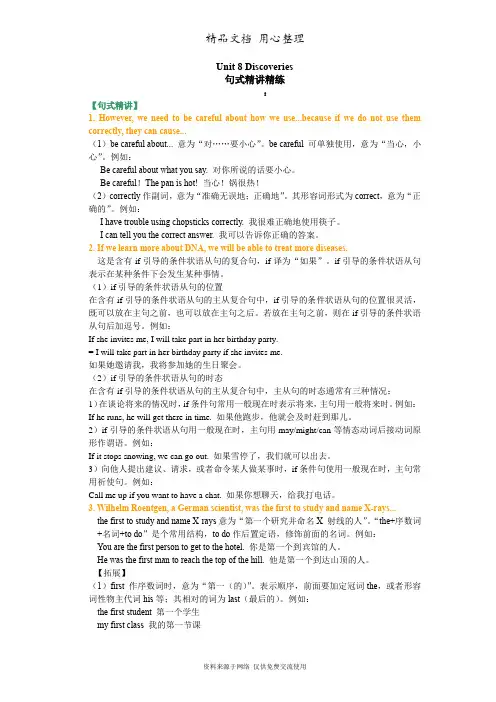
Unit 8 Discoveries句式精讲精练:【句式精讲】1. However, we need to be careful about how we use...because if we do not use them correctly, they can cause...(1)be careful about... 意为“对……要小心”。
be careful 可单独使用,意为“当心,小心”。
例如:Be careful about what you say. 对你所说的话要小心。
Be careful!The pan is hot! 当心!锅很热!(2)correctly作副词,意为“准确无误地;正确地”。
其形容词形式为correct,意为“正确的”。
例如:I have trouble using chopsticks correctly. 我很难正确地使用筷子。
I can tell you the correct answer. 我可以告诉你正确的答案。
2. If we learn more about DNA, we will be able to treat more diseases.这是含有if引导的条件状语从句的复合句,if译为“如果”。
if引导的条件状语从句表示在某种条件下会发生某种事情。
(1)if引导的条件状语从句的位置在含有if引导的条件状语从句的主从复合句中,if引导的条件状语从句的位置很灵活,既可以放在主句之前,也可以放在主句之后。
若放在主句之前,则在if引导的条件状语从句后加逗号。
例如:If she invites me, I will take part in her birthday party.= I will take part in her birthday party if she invites me.如果她邀请我,我将参加她的生日聚会。
(2)if引导的条件状语从句的时态在含有if引导的条件状语从句的主从复合句中,主从句的时态通常有三种情况:1)在谈论将来的情况时,if条件句常用一般现在时表示将来,主句用一般将来时。
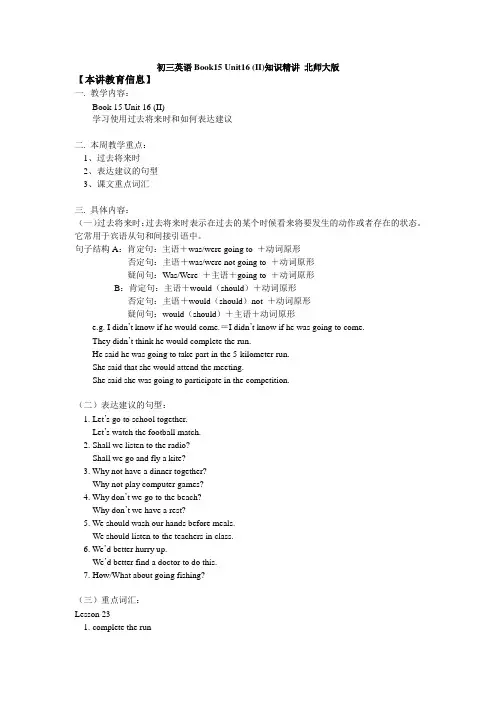
初三英语Book15 Unit16 (II)知识精讲北师大版【本讲教育信息】一. 教学内容:Book 15 Unit 16 (II)学习使用过去将来时和如何表达建议二. 本周教学重点:1、过去将来时2、表达建议的句型3、课文重点词汇三. 具体内容:(一)过去将来时:过去将来时表示在过去的某个时候看来将要发生的动作或者存在的状态。
它常用于宾语从句和间接引语中。
句子结构A:肯定句:主语+was/were going to +动词原形否定句:主语+was/were not going to +动词原形疑问句:Was/Were +主语+going to +动词原形B:肯定句:主语+would(should)+动词原形否定句:主语+would(should)not +动词原形疑问句:would(should)+主语+动词原形e.g. I didn’t know if he would come.=I didn’t know if he was going to come.They didn’t think he would complete the run.He said he was going to take part in the 5-kilometer run.She said that she would attend the meeting.She said she was going to participate in the competition.(二)表达建议的句型:1. Let’s go to school together.Let’s watch the football match.2. Shall we listen to the radio?Shall we go and fly a kite?3. Why not have a dinner together?Why not play computer games?4. Why don’t we go to the beach?Why don’t we have a rest?5. We should wash our hands before meals.We should listen to the teachers in class.6. We’d better hurry up.We’d better find a doctor to do this.7. How/What about going fishing?(三)重点词汇:Lesson 231. complete the run2. take part in3. lose one’s home4. collect money for sb.5. plenty of6. feel embarrassed7. for the two weeks before the run8. encourage sb.9. catch up with10. It takes sb. sometime to do sth.11. leave sb. behind12. wait for13. do one’s best14. keep healthy15. do regular exercisesLesson 241. host the 2008 Olympics2. be crowded with3. celebrate the success4. the Olympic movement5. have special influence6. in contrast7. two thirds of the people8. compete for hosting Olympic9. understand the spirit of OlympicsExpansion 61. be angry with2. be good at3. be proud of4. be tired ofRead the following text and complete the blanks with the correct sentences.A. Four other cities competed for hosting the Olympics besides Beijing.B. Interestingly, of all the five cities, Beijing had more support from citizens than other cities.C. Beijing was chose to be the host city for 2008 Olympics.D. Beijing’s slogan for the 2008 Olympics is “New Beijing, Great Olympics.”On July13, 2001 at a meeting of the International Olympic Committee (IOC)in Moscow, When the results came out, Beijing’s streets were crowed with thousands of people celebrating the success.Beijing had promised to host a “Green Olympics,”a “Hi-tech Olympics,”and a “People’s Olympics.” The city of Beijing had the idea of hosting the Olympic Games several years before 2001. The Chinese were fully prepared and confident in the success. The people of Beijing said, “Give Beijing a chance and we will show you how much more we can do for the Olympicmovement.”The IOC was also confident that Beijing could make the 2008 Olympics a great success. More importantly, the IOC believed that the Beijing Olympics would have special influence on China and on sports.They were Istanbul, Turkey ; Osaka; Japan; Paris, France; and Toronto, Canada.A survey showed that 94.9 percent of the people of the people of Beijing wanted to have the Olympic Games in their city. In contrast, surveys in Paris and in Toronto showed only about two thirds of the people supported the idea of having the Olympic Games in their city.【典型例题】I. 用适当的动词填空。
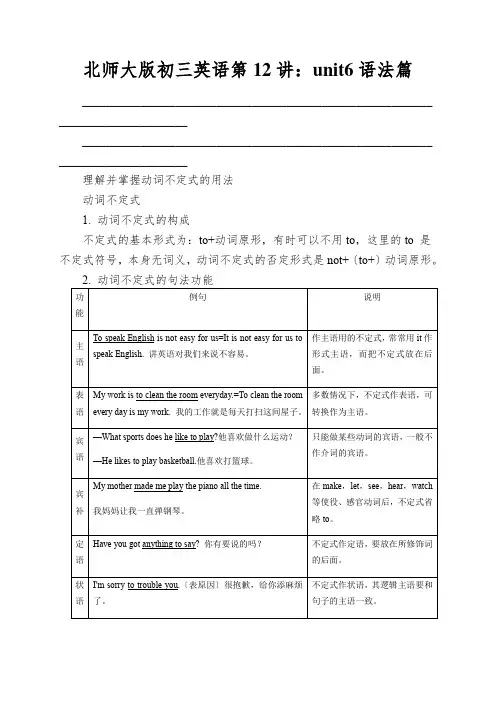
北师大版初三英语第12讲:unit6语法篇____________________________________________________________ __________________________________________________________________________________ ______________________理解并掌握动词不定式的用法动词不定式1. 动词不定式的构成不定式的基本形式为:to+动词原形,有时可以不用to,这里的to 是不定式符号,本身无词义,动词不定式的否定形式是not+〔to+〕动词原形。
(1).不定式作主语动词不定式作主语时,常用it作形式主语,而将真正的主语放在句末,其结构为:It+be+adj.〔+ for/ of sb.〕+动词不定式例如:To learn English well is useful.→It is useful to learn English well. 学好英语是有用的。
It’s important for us to protect the environment. 对于我们来说,保护环境是重要的。
注意:在kind,good,nice,clever等表示人的品质的形容词后,不用for而用of。
例如:It’s very kind of you to help me. 你帮助我真是太好了。
It’s very clever of you to do like that. 你那样做真是太聪明了。
(2). 不定式作宾语①有些谓语动词后只能用不定式作宾语,常见的这类词是表示命令、打算或希望的,如:would like, like, want, wish, hope, decide, plan, expe ct等。
例如:Would you like to see a film this evening? 你今晚想去看电影吗?②在find, think后跟不定式作宾语时,常用it代替,而将真正的宾语放在后面。
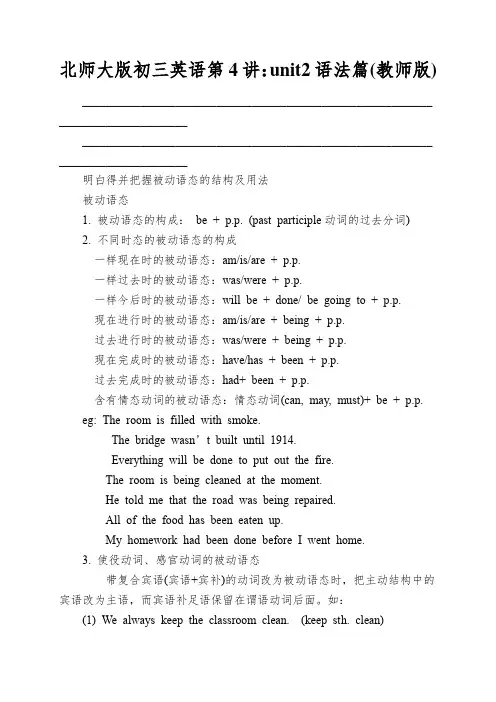
北师大版初三英语第4讲:unit2语法篇(教师版)____________________________________________________________ __________________________________________________________________________________ ______________________明白得并把握被动语态的结构及用法被动语态1. 被动语态的构成:be + p.p. (past participle动词的过去分词)2. 不同时态的被动语态的构成一样现在时的被动语态:am/is/are + p.p.一样过去时的被动语态:was/were + p.p.一样今后时的被动语态:will be + done/ be going to + p.p.现在进行时的被动语态:am/is/are + being + p.p.过去进行时的被动语态:was/were + being + p.p.现在完成时的被动语态:have/has + been + p.p.过去完成时的被动语态:had+ been + p.p.含有情态动词的被动语态:情态动词(can, may, must)+ be + p.p.eg: The room is filled with smoke.The bridge wasn’t built until 1914.Everything will be done to put out the fire.The room is being cleaned at the moment.He told me that the road was being repaired.All of the food has been eaten up.My homework had been done before I went home.3. 使役动词、感官动词的被动语态带复合宾语(宾语+宾补)的动词改为被动语态时,把主动结构中的宾语改为主语,而宾语补足语保留在谓语动词后面。

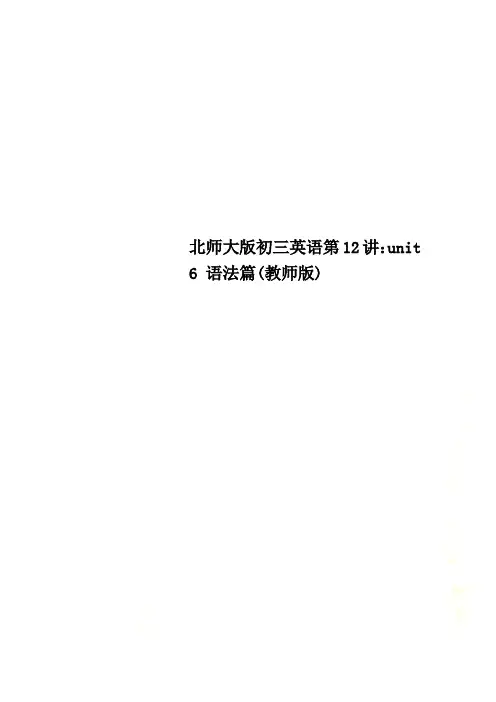
北师大版初三英语第12讲:unit 6 语法篇(教师版)Unit 6语法篇____________________________________________ __________________________________________________________________________________ ______________________________________ 理解并掌握动词不定式的用法动词不定式1. 动词不定式的构成不定式的基本形式为:to+动词原形,有时可以不用to,这里的to 是不定式符号,本身无词义,动词不定式的否定形式是not+(to+)动词原形。
2. 动词不定式的句法功能功能例句说明主语To speak English is not easyfor us=It is not easy for us tospeak English. 讲英语对我们来说不容易。
作主语用的不定式,常常用it作形式主语,而把不定式放在后面。
将真正的主语放在句末,其结构为:It+be+adj.(+ for/ of sb.)+动词不定式例如:To learn English well is useful.→ It is useful to learn English well. 学好英语是有用的。
It’s important for us to protect the environment. 对于我们来说,保护环境是重要的。
注意:在kind,good,nice,clever等表示人的品质的形容词后,不用for而用of。
例如:It’s very kind of you to help me. 你帮助我真是太好了。
It’s very clever of you to do like that. 你那样做真是太聪明了。
(2). 不定式作宾语①有些谓语动词后只能用不定式作宾语,常见的这类词是表示命令、打算或希望的,如:would like, like, want, wish, hope, decide,plan, expect等。
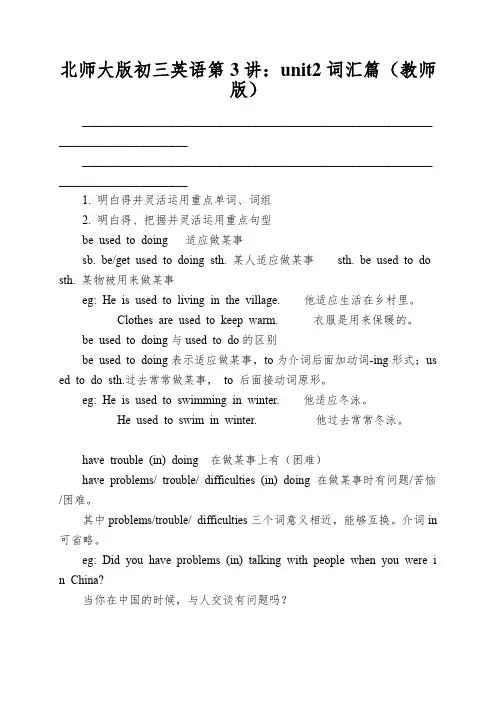
北师大版初三英语第3讲:unit2词汇篇(教师版)____________________________________________________________ __________________________________________________________________________________ ______________________1. 明白得并灵活运用重点单词、词组2. 明白得、把握并灵活运用重点句型be used to doing 适应做某事sb. be/get used to doing sth. 某人适应做某事sth. be used to do sth. 某物被用来做某事eg: He is used to living in the village. 他适应生活在乡村里。
Clothes are used to keep warm. 衣服是用来保暖的。
be used to doing与used to do的区别be used to doing表示适应做某事,to为介词后面加动词-ing形式;us ed to do sth.过去常常做某事,to 后面接动词原形。
eg: He is used to swimming in winter. 他适应冬泳。
He used to swim in winter. 他过去常常冬泳。
have trouble (in) doing 在做某事上有(困难)have problems/ trouble/ difficulties (in) doing 在做某事时有问题/苦恼/困难。
其中problems/trouble/ difficulties三个词意义相近,能够互换。
介词in 可省略。
eg: Did you have problems (in) talking with people when you were i n China?当你在中国的时候,与人交谈有问题吗?The boy has much trouble (in) reciting words. 那个男孩在背单词上有专门大的问题。
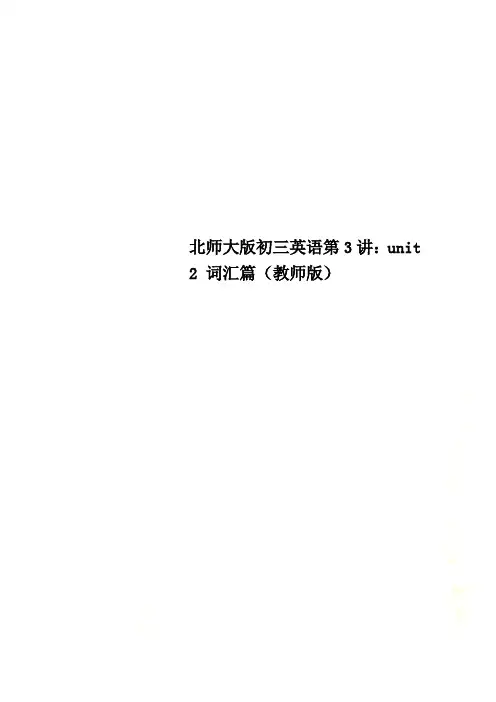
北师大版初三英语第3讲:unit 2 词汇篇(教师版)eg: He is used to swimming in winter. 他习惯冬泳。
He used to swim in winter. 他过去常常冬泳。
1.have trouble (in) doing 在做某事上有(困难)have problems/ trouble/ difficulties (in) doing 在做某事时有问题/麻烦/困难。
其中problems/trouble/ difficulties三个词意义相近,可以互换。
介词in可省略。
eg: Did you have problems (in) talking with people when you were in China?当你在中国的时候,与人交谈有问题吗?The boy has much trouble (in) reciting words. 这个男孩在背单词上有很大的问题。
2.depend on 依赖,依靠,由…决定;取决于(1) 后接名词或代词eg: I always depend on the map when I am in a strange place. 在陌生的地方,我总是依靠地图。
The price depends on the quality. 价钱取决于质量。
(2) 后接带不定式的复合结构,即dependon/upon sb. to do sth.,意思是“指望某人做某事”,可转换为depend on one(’s) doing sth.。
eg: You can’t depend on them to do it. = You can’t depend on their/ them doing it.你不能指望他们做这事。
(3) 用于“depend on/ upon it + that从句”这一结构,意思是“指望...;对...不怀疑”。
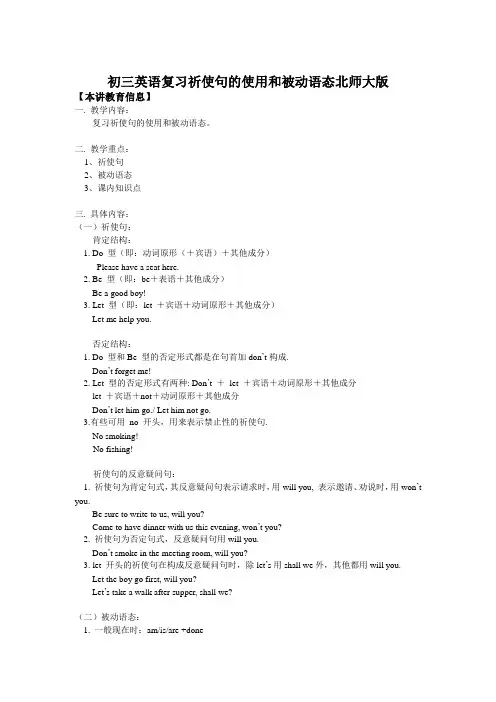
初三英语复习祈使句的使用和被动语态北师大版 【本讲教育信息】 一. 教学内容: 复习祈使句的使用和被动语态。
二. 教学重点: 1、祈使句 2、被动语态 3、课内知识点
三. 具体内容: (一)祈使句: 肯定结构: 1. Do 型(即:动词原形(+宾语)+其他成分) Please have a seat here. 2. Be 型(即:be+表语+其他成分) Be a good boy! 3. Let 型(即:let +宾语+动词原形+其他成分) Let me help you.
否定结构: 1. Do 型和Be 型的否定形式都是在句首加don’t构成. Don’t forget me! 2. Let 型的否定形式有两种: Don’t + let +宾语+动词原形+其他成分 let +宾语+not+动词原形+其他成分 Don’t let him go./ Let him not go. 3.有些可用 no 开头,用来表示禁止性的祈使句. No smoking! No fishing!
祈使句的反意疑问句: 1. 祈使句为肯定句式,其反意疑问句表示请求时,用will you, 表示邀请、劝说时,用won’t you. Be sure to write to us, will you? Come to have dinner with us this evening, won’t you? 2. 祈使句为否定句式,反意疑问句用will you. Don’t smoke in the meeting room, will you? 3. let 开头的祈使句在构成反意疑问句时,除let’s用shall we外,其他都用will you. Let the boy go first, will you? Let’s take a walk after supper, shall we?
(二)被动语态: 1. 一般现在时:am/is/are +done The book is read by children. 2. 一般过去时:was/were +done He was taken to the hospital yesterday. 3. 一般将来时:will be +done/ be going to be +done The strawberry will be frozen in three hours. Dinner is going to be cooked at 6 o’clock. 4. 情态动词+be+ done The meat should be kept in a fridge. 注意: 1、带双宾语的主动句子变为被动语态时只能将一个宾语变为主语。 We are taught English by her. English is taught to us by her. The coat was bought for me. 2、主动语态不带to的不定式变被动语态要还原to. The boss made him work over 12 hours a day. He was made to work over 12 hours a day. 3、短语动词用于被动语态应作为一个整体,不能分开。 The meeting has been put off.
初三下册英语知识点(北师大版)
Unit 8
实现 come true 快来 come on
砍伐 cut down 挂上、张贴 put up
在……顶部 on top of / at the top of 团聚 get together
挨家挨户 from house to house 圣诞颂歌 Christmas songs
圣诞精神 the spirit of Christmas 在圣诞除夕 on Christmas
Eve
在圣诞节 on Christmas Day 在床头边 at the end of the bed
圣诞老人 Father Christmas 在夜间 during the night
也 as well 好心的人 a kind-hearted man
顺着爬下来 climb down 把……装上 fill… with…
以……为根据 base on /be based on 穷人 the poor
扔下 drop down 尽管、即使 even though
不再 no longer / not any longer / no more / not any more
某人慷慨大方的精神 one’s spirit of generosity
继续活着 live on 迫不及待干某事 can’t wait to do sth
圣诞快乐 Merry Christmas 在西方国家 in western countries
春节 (the) Spring Festival 用不同的方式 in different ways
从前 once upon a time 讲述 tell of (about)
向某人讲述某事 tell sb of (about) sth 生孩子 give birth to